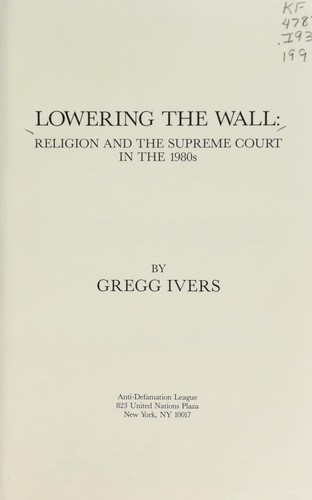lux ⛥ reviewed Lowering the wall by Gregg Ivers
Review of 'Lowering the wall' on 'Goodreads'
4 stars
Lowering the Wall: Religion and the Supreme Court in the 1980s is an intriguing analysis of the erosion of church-state separation in a particular decade of American History. The author, Gregg Ivers, warns of the degradation of several important original intentions of the founding fathers. Written in 1991, this book provides a timeless insight into the dynamic and often conflicting political mindset of the 1980's.
With Lowering the Wall, Ivers has guided us through the disturbing evolution of the U.S. Supreme Court's standing on two of the most important concepts expressed in the Constitution: the freedom of religion and worship, and the separation of church and state. He repeatedly expresses his concern that during the 1980's, the Supreme Court began to noticeably depart from these vital constitutional values.
One point that was consistently stressed by Ivers, was the rise of religious fundamentalism, or the rigid adherence to a religion in …
Lowering the Wall: Religion and the Supreme Court in the 1980s is an intriguing analysis of the erosion of church-state separation in a particular decade of American History. The author, Gregg Ivers, warns of the degradation of several important original intentions of the founding fathers. Written in 1991, this book provides a timeless insight into the dynamic and often conflicting political mindset of the 1980's.
With Lowering the Wall, Ivers has guided us through the disturbing evolution of the U.S. Supreme Court's standing on two of the most important concepts expressed in the Constitution: the freedom of religion and worship, and the separation of church and state. He repeatedly expresses his concern that during the 1980's, the Supreme Court began to noticeably depart from these vital constitutional values.
One point that was consistently stressed by Ivers, was the rise of religious fundamentalism, or the rigid adherence to a religion in American society. This rise in zealous activism occurred mainly under the presidency of Ronald Reagan. Indeed, many fundamentalists received the backing of the Reagan Administration in various pursuits to undermine the concept of the separation between church and state. A couple of these shifty endeavors included reintroducing prayer to public schools, and influencing the content of school curricula and textbooks. These rigid fundamentalists also sought to benefit from government support (i.e. monetary endorsement) in a plethora of ways, including religious displays at the public's expense. At the same time this was occurring, intolerance toward less mainstream religious practices grew. As one could reasonably infer, Ivers' feelings toward these happenings are in no way supportive.
The author also provides an integral background of the original intent of the Constitutional Framers. They, being our founding fathers, sought to give citizens a choice in personal worship and religious practices. The government was to maintain a neutrality, and through the two religion clauses of the constitution, the Founders sought to find the balance between governmental support for religion, and lawful encroachments upon religion. Ivers points out the irony in today's situation; Supreme Court Justices professing fidelity to judicial restraint, or choosing to limit the exercise of their own power, while the 'law of the land' is seen to continually depart from the original intent of the Framers of the Constitution. It seems from Ivers' point of view that adhering to original intent is not one of the prime principles of many Justices.
Probably one of the more important aspects of Lowering the Wall was Ivers' analysis of the relationship between majoritarian religions and the court, particularly the Rehnquist Court. Indeed, the author brings attention to the indisputable fact that a certain deference has been shown toward mainstream religious practices. Sadly, this respect and acknowledgement has not been extended to many unorthodox or minority religions. Minority groups, such as Native Americans, Black Muslims and Jews were all "overlooked" by the current court of the 1980s, which intended to minimize the importance of their personal religious beliefs while grossly over-promoting the importance of counteractive government interests. The rise in mainstream religious fundamentalism was obviously highly suppressive toward those of the non-mainstream variety, and Ivers is only too quick to point this out.
As any perceptive person could see, Gregg Ivers is a man with an opinion. He knowledgeably demonstrates his take on the relationship between religion and politics of the 1980s. He aptly attributes the increasingly restrictive attitude toward unorthodox religious beliefs to the rise in religious fundamentalism under the Reagan Administration. Indeed, I believe Ivers was attempting to uncover the root of the problem: Reagan himself. In his presidency, Ronald Reagan appointed a total of 376 judiciary positions, the most by any president. Three of these were Supreme Court appointments, which reveals that Reagan's personal opinion held great sway over the entire judiciary system of the 1980s.
In Lowering the Wall, Gregg Ivers places obvious emphasis on the biased nature of the courts in the 1980s. This political issue may be of no interest to some, but I find it a highly important matter, even today. Some may shrug this book off as a good example of liberal "nonsense," but I would dispute that claim. Ivers obviously favors the adherence of original intent, and who but the most staunchy of corrupt politicians could favor otherwise? At the time Lowering the Wall was published, Gregg Ivers was the Assistant Professor of Government at American University, and I am sure anyone who shrugs off his credentials is more than a little ignorant. This author provided highly legitimate sources to back his claims: direct accounts of the court cases concerning the scope of what his book covers. It is my hope that this author's writings continue to be read by interested individuals and persist long into the future.
Lowering the Wall: Religion and the Supreme Court in the 1980s is one of the most intriguing books I have ever had the chance to indulge. I must admit, the dry nature of Gregg Ivers' writing style was a mild hindrance to the readability, and yet I still enjoyed pondering his opinions. Ivers' goal is to bring awareness to the lowering of the wall between church and state in the 1980s. This slow but evident transformation of the government's interpretation of the two religion clauses took place over a decade. The evolution of America's outlook was heavily influenced by a largely conservative judiciary branch and the president himself. This book left me with the impression that government is not always progressing in the right direction, and may actually take steps backward at times. I believe this happened in the 80s, and could even be happening now.
Readers should approach this book hesitantly. Although dry, it is strongly opinionated. Ivers is very straightforward with where his allegiance lies when it comes to the political battlefield. The way Ivers explains the reasoning behind the turmoil of the 80s largely places Republicans at fault. In this case, I don't know If I could blame him. It is of my opinion that all religious beliefs and practices are equal, or in fact, one and the same. Different names have similar meanings, and diverse practices have origins akin. By law, in the United States, government is to give no preferential treatment to one religion over another. Religion cannot be endorsed, nor can it be condemned. I believe this entire system was based on balance, of which our founding fathers were the prime constructors. Irreverence or a failure to adhere to this concept can only lead to more turmoil, and disrupt the already precarious relationship between government and the people. I urge and implore the people of our nation to open their minds, to see the broader outlook. This is vitally important if we are to remain unified and stoic in the coming times.
Overall, Lowering the Wall is an excellent read for those whose hearts are set on politics. I found it interesting myself, but than again I am a bit of political speculator. Gregg Ivers is truly an intelligent individual, capable of expressing his opinions in a subtle, yet lustrous manner. Readers should strive to understand the connections Ivers frequently demonstrates, and understand the points he makes about the referenced court cases. All in all, I discovered this book to be well-rounded and quietly powerful.

